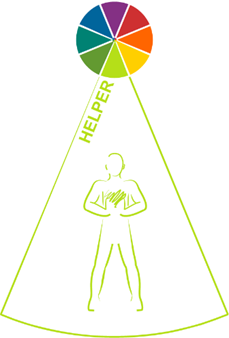Eight Color Personalities Put a Spin on Workplace Communications
You know better than most that there are more than just four generic personality types around you at home, at work or even when you’re out and about around your neighborhood. Personality is like color; there are as many shades and hues as the eye chooses to see. Strong personal characteristics can certainly follow similar patterns for different people, but they always take slightly different forms depending on the person.
Our individual histories, both environmental and genetic, teach us how to display our personalities. We subconsciously and consciously adjust our behavior in new situations whether we are at a party meeting new people for the first time or interacting with a different team in our company. We each display our personalities differently, even if there are many similarities between us.
Four more personality types
The four color personalities chart can be broken up into eight color personalities, or even 16! There is no way to represent every single personality out there in the world, but by breaking major character traits down into easy categorizations, people can begin to understand why they are the way they are.
Aside from the main four color personalities- Cool Blue, Fiery Red, Earth Green, and Sunshine Yellow- there are also four more subsets of these types that can be created. Rather than call them by a color they are called by a role they might play in the workforce that fits their personality type. These four personality types are known as the Coordinator, Helper, Motivator, and Reformer.
Coordinators are negotiators. They are willing to toe the line between two groups to come to a consensus and to make sure everyone’s voices are heard. They respond best to people who are willing, relaxed, and easy going.
Helpers seek agreement to reach a consensus during a meeting or about a project. Helpers are in tune with others who trust one another, are inventive with their solutions, and who are receptive to new ideas.
Motivators, Coordinators, Helpers, and Reformers
Motivators want to get things going and are particularly in tune with people who can match their active nature and fast paced problem solving style. Motivators don’t respond well to people who don’t speak up or who cause friction in a group.
Reformers get things done. They rely on thought and logic to solve problems and don’t always appreciate emotional appeals when dealing with a professional problem.
Jung opened up an entirely new world with his discoveries, and discoveries into the psychology of personality and the self are still being made today. Insights Discovery is based squarely on Jung’s theories, and as such is an invaluable tool in helping people understand themselves and others. Schedule me, Scott Schwefel, as your keynote speaker, and I will come to your group and address the differences in personalities in a truthful, fun, and easy-to-understand way. Follow me on Facebook, LinkedIn, and Twitter to share my blogs with the color energies you work with!




